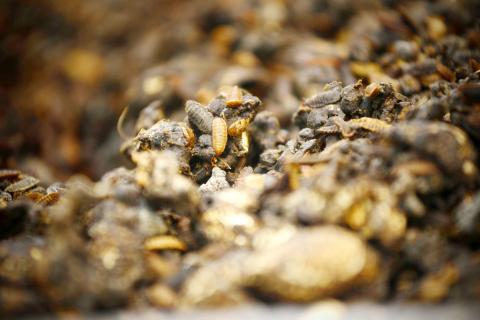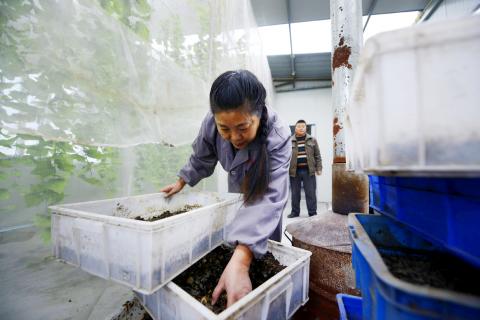Thousands of voracious white maggots wiggle frenetically while tearing through trayfuls of leftover meat, vegetables and fruit in an unusual farm in southwestern China.
It may not be a pretty sight, but the gluttonous larvae could help China eat away something far uglier: the country’s mountain of food waste.
The individual larvae of black soldier flies, which are native to the Americas, can each eat double their weight of garbage every day, according to experts. The farm in Sichuan province then turns the bugs into a high-protein animal feed and their feces into organic fertilizer.

PHOTO: AFP
“These bugs are not disgusting. They are for managing food waste. You have to look at this from another angle,” said Hu Rong, the manager of the farm near the city of Pengshan.
There’s no shortage of grub for the larvae: Each person throws away almost 30kg of food per year in China, a nation of 1.4 billion people.
“On average, one kilo of maggots can eat two kilos of rubbish in four hours,” Hu said.

PHOTO: AFP
Hu buys the discarded food from Chengwei Environment, a company that collects such waste from 2,000 restaurants in the city of Chengdu.
“If you put a fish in there, the only thing that comes out is its white skeleton,” Chengwei Environment director Wang Jinhua said.
CHICKENS AND FISH
One third of the food produced in the world for human consumption every year — approximately 1.3 billion tonnes — gets lost or wasted, while some 870 million people are going hungry, according to the UN’s Food and Agriculture Organization. This waste also exacerbates pollution problems. In a 2011 report the FAO said that if food waste were a country, it would rank behind only the US and China for greenhouse gas emissions.
Each year, China produces a total of 40 million tonnes of food waste — the equivalent weight of 110 Empire State Buildings.
But there are cultural reasons behind the issue, Wang said.
“When you invite someone to dine at a restaurant, the custom is to always order more dishes than necessary, to show your hospitality. Inevitably, the leftovers are thrown out,” he said.
But the black soldier fly, a rather long and slender critter, does more than eliminate waste.
Once fattened, some of the larvae are sold live or dried to feed animals such as chickens, fish and turtles. They boast a nutritious composition: up to 63 percent protein and 36 percent lipids.
The maggots make it possible to recover proteins and fat still present in waste, then return the nutrients into the human food cycle through the livestock.
The larval feces can even be used as organic fertilizer in agriculture.
China, Canada, Australia and South Africa are among the countries where it is legal to feed poultry and fish with insects.
“It’s more restricted in the United States and in the European Union,” said Christophe Derrien, secretary general of the International Platform of Insects for Food and Feed, a non-profit representing Europe’s insect production sector.
The EU will allow insect protein as feed in fish farms from July, Derrien said.
“It’s an encouraging first step because the EU is opening up to this more and more,” he said.
PROFITABLE?
Recycling food waste may offer an economic benefits as well as environmental ones.
Hu makes a comfortable living selling live black soldier fly larvae and fertilizer.
Taking into account costs (electricity, labor, delivery fees and the price of waste), she makes an annual profit between 200,000 and 300,000 yuan (US$29,000 to US$43,500) — a large sum in China.
It is no wonder, then, that black soldier fly farms have been surfacing all over China since the first sites appeared in the country three years ago.
“This year, we expect to open three or four new sites around Chengdu,” Wang said.
“The idea is to transform waste into useful substances.”
Leftovers are not the only thing that could get a second life in China.
Chinese energy firm Sinopec plans to build next year a factory in eastern Zhejiang province to turn cooking oil — which is sometimes illegally reused in restaurants — into biofuel for passenger planes.

Behind a car repair business on a nondescript Thai street are the cherished pets of a rising TikTok animal influencer: two lions and a 200-kilogram lion-tiger hybrid called “Big George.” Lion ownership is legal in Thailand, and Tharnuwarht Plengkemratch is an enthusiastic advocate, posting updates on his feline companions to nearly three million followers. “They’re playful and affectionate, just like dogs or cats,” he said from inside their cage complex at his home in the northern city of Chiang Mai. Thailand’s captive lion population has exploded in recent years, with nearly 500 registered in zoos, breeding farms, petting cafes and homes. Experts warn the

The unexpected collapse of the recall campaigns is being viewed through many lenses, most of them skewed and self-absorbed. The international media unsurprisingly focuses on what they perceive as the message that Taiwanese voters were sending in the failure of the mass recall, especially to China, the US and to friendly Western nations. This made some sense prior to early last month. One of the main arguments used by recall campaigners for recalling Chinese Nationalist Party (KMT) lawmakers was that they were too pro-China, and by extension not to be trusted with defending the nation. Also by extension, that argument could be

Aug. 4 to Aug. 10 When Coca-Cola finally pushed its way into Taiwan’s market in 1968, it allegedly vowed to wipe out its major domestic rival Hey Song within five years. But Hey Song, which began as a manual operation in a family cow shed in 1925, had proven its resilience, surviving numerous setbacks — including the loss of autonomy and nearly all its assets due to the Japanese colonial government’s wartime economic policy. By the 1960s, Hey Song had risen to the top of Taiwan’s beverage industry. This success was driven not only by president Chang Wen-chi’s

Last week, on the heels of the recall election that turned out so badly for Taiwan, came the news that US President Donald Trump had blocked the transit of President William Lai (賴清德) through the US on his way to Latin America. A few days later the international media reported that in June a scheduled visit by Minister of National Defense Wellington Koo (顧立雄) for high level meetings was canceled by the US after China’s President Xi Jinping (習近平) asked Trump to curb US engagement with Taiwan during a June phone call. The cancellation of Lai’s transit was a gaudy